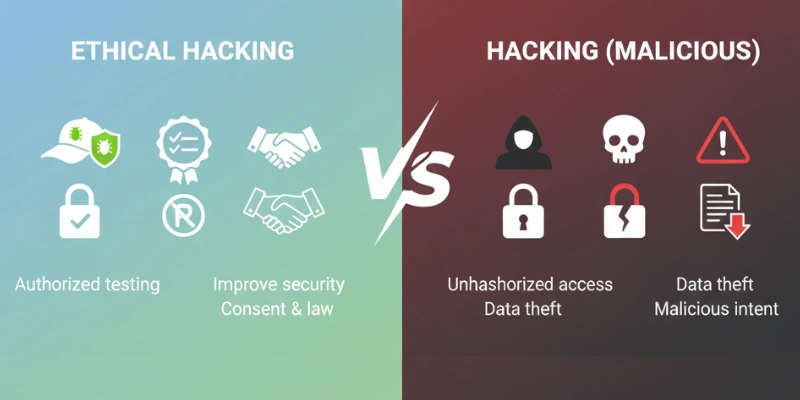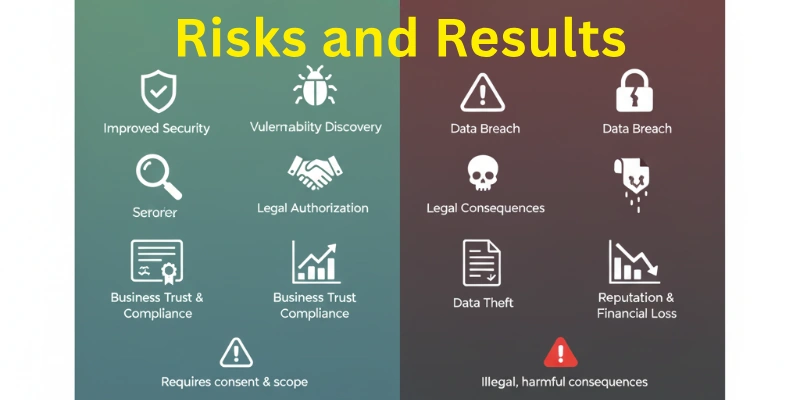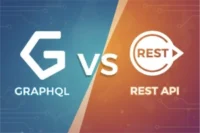Ethical Hacking vs Hacking (2025): What’s the Difference?
Published: 3 Oct 2025
Hacking is a word that many people hear today, but not everyone understands it well. Some hacking is done for bad reasons, like stealing or breaking systems. But there is also hacking that is done for good reasons, called ethical hacking. Ethical hackers use the same skills as hackers but in a safe and legal way. They help companies and people protect their data from cyber attacks.

In this article, we will explain the clear difference between ethical hacking and hacking in very simple words.
Differences between Ethical Hacking and Hacking
Here is a list of differences between ethical hacking vs hacking below:
- Purpose of Ethical Hacking vs Hacking
- Legal Side of Ethical Hacking vs Hacking
- Skills and Tools Used
- Risks and Results
- Who Should Learn It?
Let’s discuss these comparison keys in detail.
1. Purpose of Ethical Hacking vs Hacking
This section shows why ethical hackers and hackers do their work. The purpose makes the biggest difference between the two.
Ethical Hacking — Helping and Protecting
Ethical hacking is done to keep people and companies safe.
- To test systems for weak points before criminals find them.
- To protect sensitive data like passwords and bank details.
- To help companies stop cyber attacks.
- To build safer apps, websites, and software.
- To train security teams with real-life examples.
- To make the internet safer for users.
- To report and fix problems in a legal way.
Hacking — Breaking and Stealing
Hacking is often done for selfish or harmful reasons.
- To steal money, data, or important files.
- To break into accounts without permission.
- To harm companies or governments.
- To spread viruses or malware for damage.
- To blackmail people for money.
- To cause trouble just for fun.
- To gain power or secret information.
2. Legal Side of Ethical Hacking vs Hacking
This section explains how the law treats ethical hacking and hacking. One is legal and safe, the other is illegal and punishable.
Ethical Hacking — Legal and Approved
Ethical hacking is done with permission and under rules. Let’s talk about the legal points of Ethical Hacking.
- Companies hire ethical hackers for security testing.
- Work is done only after written approval.
- Ethical hackers follow strict laws and contracts.
- They cannot share or misuse private data.
- Their reports are used to fix problems safely.
- Governments support ethical hackers to fight cybercrime.
- It is a legal job with high demand.
Hacking — Illegal and Punishable
Hacking without permission breaks the law everywhere. Let’s discuss the legal points of Hacking.
- Hackers enter systems without any approval.
- Their actions break privacy and trust.
- Hacking is a criminal offense in most countries.
- Punishment includes heavy fines or jail.
- Victims can take hackers to court.
- Illegal hacking damages the hacker’s future.
- Law enforcement always tracks and catches hackers.
3. Skills and Tools Used
This section explains the main skills and tools of ethical hackers and hackers. Both may use similar skills, but the purpose is different.
Ethical Hacking — Security Tools and Training
Ethical hackers learn skills to protect, not harm.
- Knowledge of computer networks and systems.
- Training in penetration testing.
- Use of firewalls, security scanners, and antivirus.
- Skills in programming and coding.
- Strong understanding of encryption and passwords.
- Use of legal tools like Metasploit or Wireshark.
- Focus on protecting data and stopping attacks.
Hacking — Malware and Illegal Tricks
Hackers use their skills for harmful purposes.
- Creating or spreading malware like viruses.
- Using phishing tricks to steal logins.
- Breaking weak passwords and accounts.
- Installing keyloggers or trojans secretly.
- Hiding identity using fake networks.
- Copying or deleting important data.
- Using skills to attack and damage systems.
4. Risks and Results
This section shows what happens after ethical hacking or hacking. The results are very different because one is safe and the other is harmful.
Ethical Hacking — Safe and Helpful Results
Ethical hacking brings positive results for companies and people.
- Systems become safer after fixing weak points.
- Companies can protect customer information.
- Cyber attacks are stopped before they happen.
- Users feel more trust in online services.
- Hackers find it harder to break in.
- Businesses save money by avoiding data loss.
- Ethical hackers earn respect for their work.

Hacking — Harmful and Dangerous Results
Hacking usually leads to damage, loss, and crime.
- Victims lose personal data or money.
- Companies face loss of customers and trust.
- Governments may lose secret information.
- Malware spreads and harms many users.
- Hackers cause fear and confusion online.
- Businesses spend huge money to repair damage.
- Hackers risk punishment, jail, or a ruined future.
5. Who Should Learn It?
This section explains who should learn ethical hacking and why hacking is not a safe choice.
Ethical Hacking — Students and Security Experts
Ethical hacking is a good career and safe skill to learn.
- Students who want a career in cybersecurity.
- IT professionals who manage systems and networks.
- Security experts who protect big companies.
- People interested in solving online threats.
- Workers who want better job opportunities.
- Beginners who want to learn legal hacking skills.
- Anyone who wants to protect data and people.
Hacking — Criminals and Wrong Use
Hacking is not a safe skill to learn for bad purposes.
- Criminals who want to steal money or data.
- People looking for shortcuts to harm others.
- Hackers who sell stolen accounts online.
- Groups trying to attack governments or companies.
- Teenagers who misuse skills without guidance.
- Cybercriminals hiding from law enforcement.
- People who take risks and end up punished.
Quick Comparison Table: Ethical hacking vs Hacking
Here is a quick comparison table of Ethical Hacking and Hacking.
| Feature | Ethical Hacking | Hacking |
| Purpose | To protect systems and data | To break into systems for harm or gain |
| Legal Status | Legal and approved by companies | Illegal and against the law |
| Skills Used | Cybersecurity and defensive methods | Malware, phishing, and exploits |
| Tools | Security software, scanners, firewalls | Viruses, keyloggers, trojans |
| Risks | Safe and helpful | Harmful and dangerous |
| Benefit | Improves security and trust | Causes loss, damage, and crime |
Things to be Done When You Think You Are Hacked
If you feel your computer, phone, or account is hacked, act fast but stay calm. Follow safe steps to stop more harm and protect your money and data.
Immediate Actions — Stop the damage now
Do these first to block the attacker quickly.
- Turn off Wi-Fi or disconnect the device from the internet.
- If on a phone, switch to airplane mode to stop data flow.
- Do not log into important accounts on the hacked device.
- Use a different clean device to change passwords for email and bank.
- Contact your bank or card company if money or cards may be at risk.
- Run a full antivirus or malware scan on the affected device (if safe).
- Take screenshots of strange messages or screens for records.
Follow-up Actions — Fix and protect for later
After the immediate steps, do these to clean up and stay safe.
- Update your device software, apps, and antivirus to the latest version.
- Remove unknown programs or apps and uninstall suspicious extensions.
- Enable two-factor authentication (MFA) on important accounts.
- Check account activity and logout other devices from your accounts.
- Back up important files to an external drive or cloud (from a clean device).
- Report the hack to the proper place (bank, website support, or local cybercrime team).
- If unsure, get help from a trusted tech person or professional service.
Which is Better in this Year?
Ethical hacking and hacking may use similar skills, but their goals are completely different. Ethical hacking is always the better choice because it is safe, legal, and helpful, while hacking is harmful and risky.
Why Choose Ethical Hacking
Let’s see why choose ethical hacking.
- Legal job with high demand.
- Helps protect people and companies.
- Builds trust and safety online.
- Gives better career growth.
- Improves knowledge of cybersecurity.
- Respectful and professional path.
- Safe way to use hacking skills.
Why Avoid Hacking
Let’s talk about why we should avoid hacking.
- Illegal and against the law.
- Can lead to jail or heavy fines.
- Destroys trust and reputation.
- Causes damage to people and companies.
- Risk of getting caught by police.
- No stable future or career.
- Brings fear instead of respect.
Conclusion
Ethical hacking and hacking may sound similar, but they are very different. Ethical hacking is legal and helps to protect systems, while hacking is illegal and causes harm. Companies trust ethical hackers to keep data safe and stop cybercrime. Hackers, on the other hand, break into systems and steal for selfish reasons.
One path builds a career and respect, while the other destroys trust and leads to punishment. In this the better and safer choice is always ethical hacking. Choosing it means using your skills for good and for a brighter future.
FAQs about Ethical Hacking vs Hacking
Here are some of the most frequently asked questions related to ethical hacking and hacking.
Ethical hacking is done with permission to protect systems, while hacking is done without permission to harm or steal. Ethical hackers use their skills for safety, but hackers use them for damage.
Yes, ethical hacking is legal because it is approved by companies and follows the law. Ethical hackers work under rules and contracts to protect systems. They use their skills in a safe and trusted way.
Yes, hackers can become ethical hackers if they change their mindset. By learning rules, laws, and working for companies, they can use their skills in a positive way. Many choose this path for a better future.
Ethical hackers need strong knowledge of networks, coding, and cybersecurity tools. They must know how to test systems safely. They also need problem-solving skills to stop attacks before they happen.
Hacking is illegal because it breaks into systems without permission and harms people or companies. It steals private data and causes damage. That is why laws punish hacking with fines or jail.
Yes, ethical hacking is a fast-growing and high-demand career. Companies pay well to protect their data and systems. Ethical hackers earn respect while building a strong future in cybersecurity.
Yes, both use some of the same tools, but the purpose is different. Ethical hackers use tools legally to test and secure systems. Hackers use the same tools illegally to attack and steal.
Yes, ethical hacking can help stop hackers by finding weak points before they do. Ethical hackers build stronger security walls for companies. Their work makes it harder for hackers to succeed.
The pay depends on skills and location, but ethical hackers earn a good income. Companies pay high salaries because security is very important. Many also get extra benefits and career growth.
Yes, ethical hacking is safe if you learn it the right way with legal training. Beginners can join courses and practice with permission. It is a safe skill that leads to many career chances.

- Be Respectful
- Stay Relevant
- Stay Positive
- True Feedback
- Encourage Discussion
- Avoid Spamming
- No Fake News
- Don't Copy-Paste
- No Personal Attacks

- Be Respectful
- Stay Relevant
- Stay Positive
- True Feedback
- Encourage Discussion
- Avoid Spamming
- No Fake News
- Don't Copy-Paste
- No Personal Attacks





